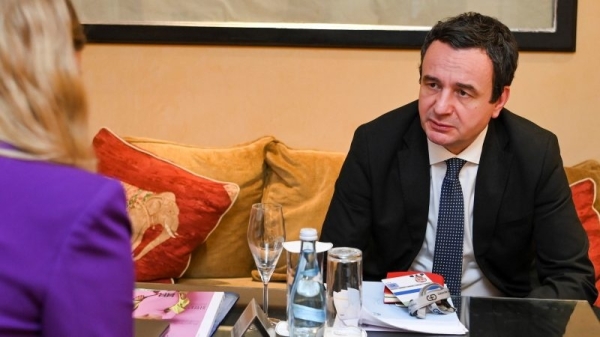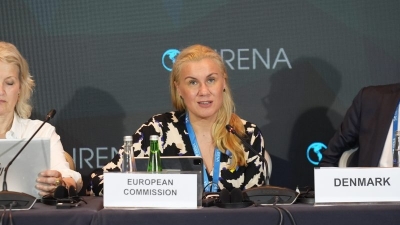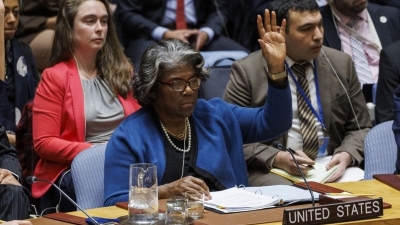Belgrade-Pristina deal possible this year, Kosovo PM Kurti says

Kosovo and Serbia aim to conclude a landmark agreement on normalising relations “this year”, Kosovo’s Prime Minister Albin Kurti told EURACTIV in an exclusive interview but made clear it would not be smooth sailing, despite increased Western engagement.
“We need normalisation of relations, and this can be achieved with mutual recognition as the centrepiece,” Kurti said, zeroing in on a key problem: Belgrade has been adamant it would not formally recognise the independence of its former province, although it may agree to a ‘de facto’ recognition.
Kurti’s comments came ahead of a high-level meeting in Brussels on Monday (27 February), where leaders of Serbia and Kosovo are expected to endorse a deal to normalise strained relations.
The updated EU proposal, received by both parties before the start of an EU-Western Balkan summit in Tirana last December but not yet made public, is said to include mutual recognition of official documents, increased financial aid and other measures to improve people’s lives in both countries.
Serbia, Kosovo leaders expected to endorse EU plan to normalise relations
Serbia and Kosovo are expected to endorse a deal to normalise strained relations as at a high-level meeting in Brussels later on Monday (27 February), despite efforts from Russia to meddle in the process, according to a senior EU official.
Asked about the prospect of concluding a deal by the end of this year, according to the timeline that EURACTIV understands is spelt out in the EU proposal, Kurti said, “certainly the goal is to get this agreement this year”.
“What has been left to negotiate – and it won’t be easy at all – is a mechanism for implementation, international guarantees and time sequencing of what, how and when,” Kurti said.
Association of Serb municipalities
Aside from the mutual recognition, the most contentious issue is a planned association of Serb-majority municipalities in Kosovo, which Pristina fears could create a breakaway region and Kurti has been reluctant to accept, although Serbia and the West point out it had been agreed a decade ago.
Leaders of Kosovo’s ethnic Albanian majority argue such a body would give Belgrade an outsized influence in their country while Belgrade says it is needed to protect the rights of ethnic Serbs.
Serbia’s President Aleksandar Vučić “is still after territorial ethno-nationalism,” Kurti said when asked about his counterpart’s rhetoric.
“Basically, he would use the Association of Serb Municipalities as a new name for Republika Srpska,” he said, referring to the highly autonomous Serb entity created in Bosnia-Herzegovina after the 1991-95 war.
“Signing the agreements and implementing the agreements in the Balkans have been two different planets, and we need to bring them into the same continent;” he said, adding that “two-thirds of the agreements signed in Brussels throughout previous decades, have not been implemented by Serbia”.

EU redrafts proposal on Serbia-Kosovo ties as Pristina sets sight on membership
The EU has handed over an updated draft of its proposal for the normalisation of ties between Kosovo and Serbia to the two Western Balkan countries, with a timeline and an outline of actions, EURACTIV.com has learnt.
The current EU proposal, Kurti said, would refer to ‘national minorities’ in its preamble and universal concepts such as independence, territorial integrity, sovereignty, reciprocity, human rights, democracy, rule of law and self-determination.
“What makes me optimistic is the fact that certain universal concepts and notions are employed in this proposal in contrast to the decade before me coming to power, where the 33 agreements were based more in the ideology of problem-solving,” he said.
He said previous proposals were too complex and detailed and therefore difficult to sell to the public, whereas the latest one has only one major stumbling block.
“One out of 33 agreements did not pass the test of our constitution because it is referred to as a mono-ethnic association,” Kurti said, responding to increasing pressure from the EU and the US to create the association of Serb municipalities.
“We should be very careful not to do agreements, which failed the test of human rights of the constitution of democratic and republican order, but at the same time, we should bear in mind that all over the Balkans you have national minorities – their rights cannot be identic,” he said.
“But nonetheless, we shall not create these imbalances, which become a source of further tensions,” he added.
Kurti said the EU proposal must not cherrypick from the 33 unimplemented agreements, adding that mutual recognition must underpin the entire process.
“On the other hand, at the centre, there must be mutual recognition – it is not possible to serve coffee without a cup – whatever you do in terms of rights and mechanisms the state is a platform which ensures those rights and those mechanisms,” Kurti said.
Progress with non-recognisers
Five EU countries – Spain, Slovakia, Cyprus, Romania, and Greece – have refused to recognise Kosovo’s independence. Meanwhile, Serbia has continued lobbying other states to withdraw theirs.
With the Belgrade-Pristina normalisation process likely to be tied to the EU accession of both countries, senior EU officials have recently indicated they would be “expected to react” to such development.
Asked if he believed progress has been made in lobbying the EU non-recogniser states, Kurti said “there is increased communication and cooperation, while the atmosphere is much better with all of them”.
According to Kurti, concrete steps have been made with Greece, with Kosovo’s office in Athens having elevated its status into an office for economic affairs.

Kosovo president: Progress made in lobbying non-recognisers
After Kosovo unveiled plans to apply for EU membership before the end of the year, its president told EURACTIV in an interview that progress is being made in lobbying the five EU member states that currently do not recognise the country.
“There have been a lot of misunderstandings in the past regarding similarities of internal situations among the countries and bit by bit different representatives of these five non-recognisers are noticing that actually the analogy does not stand,” Kurti said.
“We are a success story of quality democracy and economic development and I think this will be acknowledged by the EU to help us move rather fast,” Kurti said.
“Sweden and Finland, from the moment of application to the accession took three years. On Malta and Cyprus, 14, the average is nine – so I think it’s reasonable for us to go after this average,” he added.



